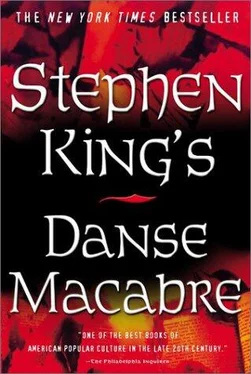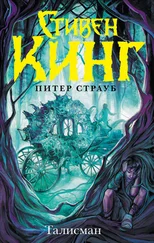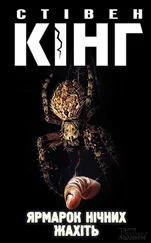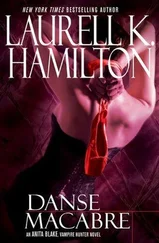And if they avoid all that, I hope they catch poison oak.
My job is done, I think. My grandfather told me once that the best map is one that points to which way is north and shows you how much water is in your way. That's the sort of map I've tried to provide here. Literary criticism and rhetoric aren't forms I'm comfortable with, but I'd just as soon talk books for . . . well, for two months at a time is the way it looks. Somewhere in the middle of "Alice's Restaurant," Arlo Guthrie tells his audience, "I could play all night. I'm not proud . . . or tired . . ." I could say much the same thing. I haven't talked about Charles Grant's Oxrun Station books, or Manley Wade Wellman's Appalachian bard John, he of the silver-stringed guitar. I've had only a chance to touch briefly on Fritz Leiber's Our Lady of Darkness (but gentle reader, there is a pale brown thing in that book that will haunt your dreams). There are dozens of others. No, I take that back. There are hundreds .
If you need a slightly longer arrow-or if you're just not tired of talking about books yet- glance at Appendix II, where there is a list of roughly one hundred books issued during the thirty years we've been jawing over here, all of them horror, all of them excellent in one way or another. If you're new to the field, you'll find enough stuff to keep you quaking in your boots for the next year and a half. If you're not, you'll find you've read many of them already . . . but they'll give you my own hazy conception of where north lies, at least.
The Last Waltz-Horror and Morality, Horror and Magic
1
"YES, BUT HOW do you justify earning a living by feeding off people's worst fears?”
2
The police have been summoned by a neighbor who has heard a commotion of some kind.
What they find is a bloodbath-and something worse. The young man admits, quite calmly, that he has murdered his grandmother with a pipe, and then cut her throat.
"I needed her blood," the young man tells the police calmly. "I'm a vampire. Without her blood, I would have died.” In his room the police find magazine articles about vampires, vampire comic books, stories, novels.
3
We'd been having a pretty nice lunch, this reporter from the Washington Post and I, something I was grateful for. I'd just started a twelve-city tour for my novel The Dead Zone the day before in New York with a kick-off party thrown by the Viking Press at Tavern on the Green, a huge, rococo eating and drinking establishment on the edge of Central Park. I had tried to take it easy at the party, but I still managed to put away about eight beers there, and another six or so at a smaller, more relaxed party with some friends from Maine later on.
Nevertheless I was up the next morning at quarter of five to make the six o'clock Eastern shuttle to Washington so I could, in turn, make a seven o'clock TV appearance to plug my novel. Welcome to touring, friends and neighbors.
I made the shuttle handily, telling invisible beads as it took off in a pouring rainstorm (sitting next to an, overweight businessman who read the Wall Street Journal through the entire flight and ate Turns one after another, deliberately and reflectively, as if enjoying them) and made A.M. Washington with at least ten minutes to spare. The television lights intensified the mild hangover I'd gotten up with, and I was grateful for what had been a fairly laid-back lunch with the Post reporter, whose questions had been interesting and relatively unthreatening. Then this spitball about feeding off people's fears comes out of nowhere. The reporter, a young, lanky guy, was looking at me over his sandwich, eyes bright.
4
It's 1960, and a lonely Ohio youth has left the movie theater where he has just seen Psycho for the fifth time. This young man goes home and stabs his grandmother to death. The pathologist would later count over forty separate stab wounds.
Why? the police asked.
Voices, the young man replies. Voices told me to do it .
5
"Look," I said, putting my own sandwich down. "You take any bigcity psychiatrist. He's got a marvelous home in the suburbs, a hundred thousand dollars' worth of house at the very least.
He drives a MercedesBenz, either tobacco-brown or silver-gray. His wife has got a Country Squire wagon. His kids go to private schools during the academic year and to good summer camps in New England or in the northwest every summer. Sonny has got Harvard if he can make the grades-money is certainly no problem-and his daughter can go to some reet and compleet girls' school where the sorority motto is `We don't conjugate, we decline.' And how is he making the money that produces all of these wonders? He is listening to women weep over their frigidity, he is listening to men with suicidal impulses, he is dealing with paranoia both high and low, he's maybe striking on the occasional true schizophrenic. He's dealing with people who most of all are scared shitless that their lives have somehow gotten out of control and that things are falling apart . . . and if that isn't earning a living by feeding off people's fears, I don't know what is.” I picked up my sandwich again and bit into it, convinced that if I hadn't hit the spitter he had thrown me, I'd at least managed to foul it back and stay alive at the plate. When I looked up from my Reuben, the little half-smile on the reporter's face was gone.
"I," he said softly, "happen to be in analysis.”
6
January of 1980. The woman and her mother are having a worried conference over the woman's three-month-old baby. The baby won't .stop crying. It always crier. They agree on the source of the problem: the baby ha been possessed by a demon, like that little girl in The Exorcist. They pour gasoline on the baby as it lies crying in its crib and then light the child on fire to drive the demon out. The baby lingers in a burn ward for three days. Then it dies.
7
The reporter's article was clean and fair for all of that; he was unkind about my physical appearance and I suppose he had some cause-I was in the slobbiest shape I've been in for ten years during that late summer of 1979-but other than that, I felt I got a pretty square shake. But even in the piece he wrote, you can feel the place where his path and mine diverged; there is that quiet snap which is the sound of ideas suddenly going off in two completely different directions.
"You get the impression that King likes this sort of sparring," he wrote.
8
Boston, 1977. A woman is killed by a young man who uses a number of kitchen implements to affect the murder. Police speculate that he might have gotten the idea from a movie-Brian De Palma's Carrie, from the novel by Stephen King. In the film version, Carrie kills her mother by causing all sorts of kitchen implements-including a corkscrew and a potato-peeler-to fly across the room and literally nail the woman to the wall.
9
Prime-time television survived the call by pressure groups to end the excessive, graphic depiction of violence on the tube for over ten years and House and Senate subcommittees almost without number which were convened to discuss the subject. Private eyes went on shooting bad guys and getting clopped over the head after the assassinations of John F.
Kennedy, Robert F. Kennedy, Martin Luther King; you could order up a dose of carnage at the twist of the channel selector on any night of the week, including Sundays. The undeclared war in Vietnam was heating up quite nicely, thank you; body counts were spiralling into the stratosphere. Child psychologists testified that after watching two hours of violent prime-time TV, groups of children in the test group showed a marked increase in play aggressiveness- beating the toy truck against the floor rather than rolling it back and forth, for instance.
Читать дальше










